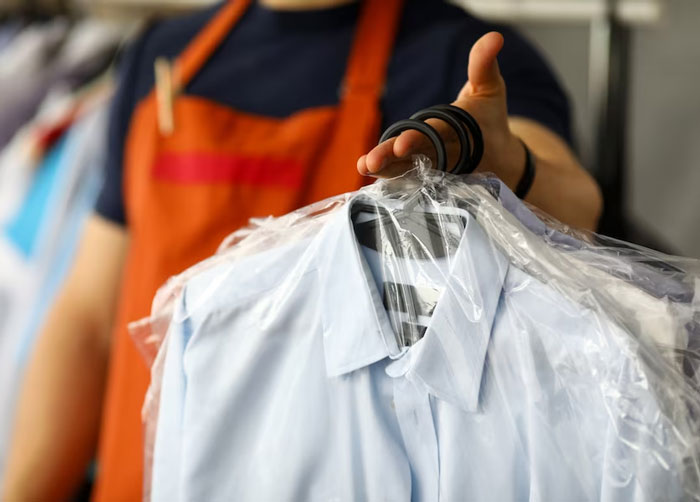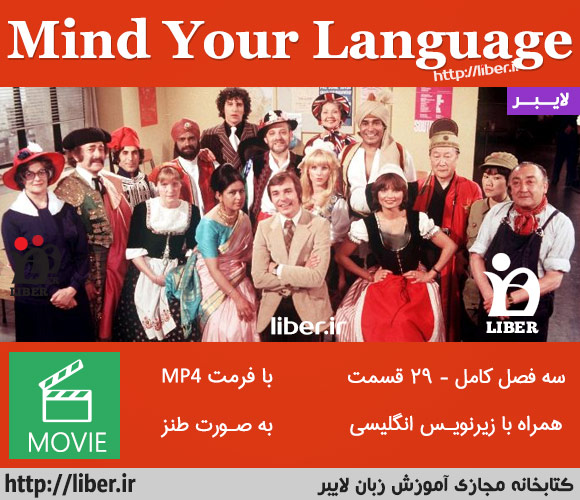همه ما نیاز داریم که لباسهایمان را بشوریم. برای لباسهای ساده تر و دم دستی معمولا خودمان اینکار را با لباسشویی هایی که در منزل داریم انجام می دهیم. اما برخی لباسها به خصوص لباسهای مجلسی را نمی توان با آب یا لباسشویی های منزل شست. برای همین معمولا هر از گاهی سر و کارمان با مغازه های خشکشویی می افتد. مغازه خشکشویی به انگلیسی Dry Cleaner’s گفته می شود. به علامت آپاسروف و s دقت کنید. به خود خشکشویی در انگلیسی Dry-cleaning می گویند و کسی که در این مغازه ها کار می کند Dry cleaner است. حالا یک مکالمه درباره مغازه خشکشویی به انگیسی داریم و در انتها اصطلاحات خشکشویی به انگلیسی را بررسی می کنیم.
🗣 Dry Cleaner’s (در مغازه خشکشویی)
A: Thank god you are open! I have an emergency!
خدا رو شکر که شما باز هستید! من یک کار ضروری (فوری، عجله ای) دارم.
B: Hello Mr. Henderson. What can I do for you?
سلام آقای هندرسون. چیکار میتونم براتون انجام بدم؟
A: I need this dress and this suit dry cleaned ASAP!
من می خوام این لباس (زنانه مجلسی) و این کت و شلوار در سریعترین زمان ممکن شسته بشن (خشکشویی بشن)
B: OK, I can have it ready by the end of the week.
باشه، می تونم تا اخر هفته آماده اش کنم.
A: No you don’t understand, I need this tomorrow morning!
نه متوجه نشدید، من این رو فردا صبح نیاز دارم!
I accidentally spilled beer all over my wife’s dress and we have a wedding to attend tomorrow!
من تصادفی آبجو رو روی لباس همسرم ریختم و فردا باید به یک عروسی برویم!
She’s gonna kill me!
اون من رو میکشه!
B: Ok, I can have it ready tomorrow afternoon, but this suit is also very stained.
باشه، می تونم تا فردا بعد از ظهر آماده اش کنم، اما این کت و شلوار هم خیلی لک افتاده.
I can’t guarantee we can remove it completely.
نمی تونم تضمین کنم که کامل از بین بره (لکه ها)
A: Fine! Can you also iron and starch this shirt?
اشکالی نداره! می تونید اتو و آهار هم به این پیراهن بزنید؟
B: Certainly.
بله قطعا.
A: Great! This is our secret! If you see my wife, say nothing to her about this!
عالی! [خوب] این راز بین ماست! اگر همسر من رو دیدین، در این مورد هیچی بهش نگید!
🗝️ لغات انگلیسی مهم مکالمه
🔹 dry clean: خشکشویی
🔹 spill: ریختن چیزی (مایعات) معمولا روی لباس یا زمین
▪️ He slipped and the wine spilled all over the carpet.
نکته : کلمه all over در مکالمه، به معنی این است که روی همه آن لباس ریخته است. ولی خوب در ترجمه فارسی برای روان بودن نیاورده شد.

🔹 stain: لکه لباس
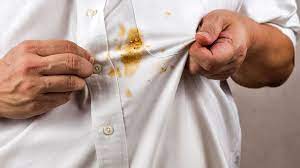
🔹 starch (v): آهار زدن به لباس با نشاسته
🔹 iron (v): اتو زدن
🔹 delicate: لباس یا هر چیزی که از پارچه ظریف و لطیف ساخته شده باشد
🔹 fabric: جنس پارچه یک لباس، لباس، تار و بافت لباس
🔹 neighborhood: یک محله
🔹 press (v) = iron: به همان معنی اتو زدن است.
🔹 hanger: گیره لباس
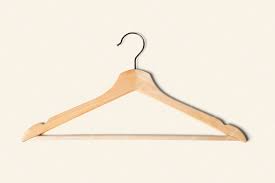
🎯 نکات درس
به کلمات Iron و Starch دقت کنید. معنی این دو کلمه در حالت اسم می شود : آهن و نشاسته.
اما وقتی این دو در حالت فعل به کار می روند، Iron (اشاره به دستگاه اتو که از آهن می شده) دارد و به معنی اتو کردن است (کلمه دیگر اتو کردن press است که به تنهایی به معنی فشار آوردن هم می دهد). همچنین Starch در حالت فعل به معنی آهار دادن به لباس با استفاده از نشاسته است. 1
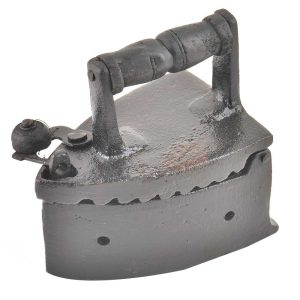
نکته دیگر در انگلیسی مثل سایر زبانها، برای هر مفهوم گاهی دو یا سه کلمه یا فعل مختلف وجود دارد. همیشه از ساده ترین و دم دست ترین و عمومی ترین آنها استفاده نکنید چون سطح مکالمه شما پایین می آید. به عنوان مثال همیشه نگویید We want to go to a wedding. مثلا در این مکالمه میبینید که از فعل Attend به معنی حضور یافتن در مراسمات استفاده شده است. همیشه اینگونه فعل ها را به ذهن داشته باشید تا موقع صحبت کردن از آنها استفاده کنید و مکالمه خود را زیباتر کنید.
🔸 Attend : to go to an event such as a meeting or a class
🎧 پادکست صوتی آموزش انگلیسی
متن پادکست
Hello everyone, my name is Marco.
And my name is Katherine and today we have a very exciting elementary lesson for you.
That’s right.
We are going to take our clothes to the dry cleaners.
Oh, okay.
So that means we have some dirty clothes.
They need to be cleaned.
Let’s listen to this dialogue one time and when we come back, we’ll be talking about the words and phrases that you hear in it.
Thank God you were open.
I have an emergency.
Hello, Mr. Henson.
What can I do for you?
I need this dress and this suit dry cleaned ASAP.
I can have it ready by the end of the week.
No, you don’t understand.
I need this tomorrow morning.
I accidentally spilled beer all over my wife’s dress and we have a wedding to attend tomorrow.
She’s going to kill me.
I can have it ready tomorrow afternoon, but this suit is also very stained.
I can’t guarantee we can remove it completely.
Fine.
Can you also iron and starch this shirt?
Certainly.
Great.
This is our secret.
If you see my wife, say nothing to her about this.
All right.
We’re back.
Now there are probably a couple of words that you didn’t understand, so why don’t we look at those now in language takeaway?
Language takeaway.
Marco, you already told our listeners about one phrase, to dry clean, so dry cleaned.
All right.
That’s when you take your clothes to a professional who doesn’t only wash them.
You don’t just put water and soap on it.
They actually put some special chemicals and use special machines to get very hard to remove stains from it.
Exactly.
This is often what we use when we clean coats or fancy shirts and dresses because you don’t want to clean those yourself.
You can’t put those in the washing machine.
No.
This is the dry cleaner.
That’s the name of the place.
The action, what they do is they dry clean clothes.
Very good.
I mentioned that we take them to the dry cleaners because we want to remove stains.
So a stain is a mark or some color that does not come off, does not go away.
All right.
So for example, sometimes you can have a wine stain.
Ooh, wine stains are the worst.
They’re red and they never come off or blood stain.
Or blood stain.
So you can, a stain is a noun, but you can also use it as an adjective.
My shirt is stained.
So it’s stained.
My pants are stained and I can’t wear them again.
Again.
Now that’s also, you can also use it as a verb.
I stained my pants.
All right.
So it’s a verb, it’s a noun and an adjective, all in one.
Easy to remember.
Well, there’s another word that’s well related to this word.
We spilled something.
So I spilled wine and it stained my shirt.
So to spill and that means that you took some liquid and you put it onto your clothes.
Before you dropped it and it made a mess.
So spill.
I spilled some milk.
Spilled.
Now it’s pronounced differently from spell, right?
That’s right.
It has an I spilled.
All right.
Now our next word is also a noun and a verb to iron.
To iron means to make something flat with no lines.
To smooth it out.
So we use an iron to iron.
Exactly.
Electronic object.
It gets very hot.
So you wash your shirts, for example, and your shirts are wrinkled because you just wash them.
So you need to iron them.
That’s right.
And so you smooth them out, you flatten them with this object and iron.
And well, usually if you take them to the dry cleaners, they will iron them and also starch them.
So when you use something means to use some powder or chemical to make something stiff or hard.
So the noun or the chemical is also called starch.
Exactly.
So you think of a shirt with many buttons that a man wears to work.
He has a collar around his neck and that needs to be high and tall.
It can’t be flat and wrinkled.
And so a dry cleaner will use starch to make sure that this stands up.
Very good.
So those are five key words for the dialogue today.
Let’s listen to the dialogue again and we’ll be back with Fluency Builder.
Thank God you were open.
I have an emergency.
Hello, Mr. Henson.
What can I do for you?
I need this dress and this suit dry cleaned ASAP.
I can have it ready by the end of the week.
No, you don’t understand.
I need this tomorrow morning.
I accidentally spilled beer all over my wife’s dress and we have a wedding to attend tomorrow.
She’s gonna kill me.
I can have it ready tomorrow afternoon but this suit is also very stained.
I can’t guarantee we can remove it completely.
Fine.
Can you also iron and starch this shirt?
Certainly.
Great.
This is our secret.
If you see my wife say nothing to her about this.
All right.
We’re back now so let’s take a look at Fluency Builder.
Thank God.
All right.
What is this phrase?
Thank God.
This is a phrase we use in English to say that we’re happy about something or that we’re relieved.
So maybe I’m nervous that the mail isn’t going to come today and then the mail comes and I say, oh, thank God the mail came.
I’m happy.
I was hoping it would come.
So you’re relieved.
Thank God.
Now, is it, well, we are using the word there God but it doesn’t really have a kind of like a religious connotation that much, right?
Not anymore.
No.
It’s usually just a phrase.
Exactly.
Now what about this acronym ASAP or ASAP?
ASAP.
So as soon as possible, it’s an acronym so the first letter comes from the word.
It means as soon as possible, very quickly, right away.
You always hear that in an office setting as well.
I need those papers ASAP.
I need those reports ASAP.
Exactly.
So you can say it either way ASAP or ASAP and it means immediately.
And he said that he needed the suit ASAP and he said, I can have it ready by the end of the week.
So that might not be fast enough for the client, for the person here who has the stain, but the end of the week is a very, very useful phrase because it means that maybe today is
Monday or Tuesday, by Friday or Saturday, we’ll have this ready for you because we think of the end of the week as Friday maybe, Thursday, Friday.
So I can say the end of the week or the end of the day.
Exactly.
The end of the month.
Or the end of the year.
Exactly.
So the end of is usually the last time.
So thank goodness it’s the end of the week.
I’m ready for my weekend.
Very good.
There are some phrases there as well.
Let’s listen to the dialogue for the last time.
Thank God you were open.
I have an emergency.
Hello, Mr. Henson.
What can I do for you?
I need this dress and this suit dry cleaned ASAP.
I can have it ready by the end of the week.
No, you don’t understand.
I need this tomorrow morning.
I accidentally spilled beer all over my wife’s dress and we have a wedding to attend tomorrow.
She’s going to kill me.
I can have it ready tomorrow afternoon, but this suit is also very stained.
I can’t guarantee we can remove it completely.
Fine.
Can you also iron and starch this shirt?
Certainly.
Great.
This is our secret.
If you see my wife, say nothing to her about this.
All right.
We’re back.
So now dry cleaning, ironing.
Are you good at this or do you get a lot of your clothes dry cleaned?
I’m pretty good at this actually.
I don’t like to wash clothes.
I get really bored with the washing machine, but I actually really like ironing.
Really?
I find it very relaxing.
Really?
I usually find it very frustrating.
Really?
Why is that?
Because I can’t really iron well because I start on one side and I’m getting all the lines out and then the other side gets wrinkled or, you know, lines appear what I don’t want
them to appear.
It’s very frustrating for me.
It is frustrating.
It takes some practice.
My suggestion is to use the spritzer.
You know that in the iron, there’s some water that can come out?
Like that?
Well, if you spray the water, it makes the lines go out for longer, right?
Because if you iron over that, it’s more permanent.
I’ve also seen some sprays sometimes that you can spray your clothes with some special chemical.
That’s not actually starch, but it helps remove the wrinkles quicker.
Exactly.
I don’t use that.
I use water generally, but they’re all available.
All right.
So that’s all the time we have for today.
Bye, everyone.
